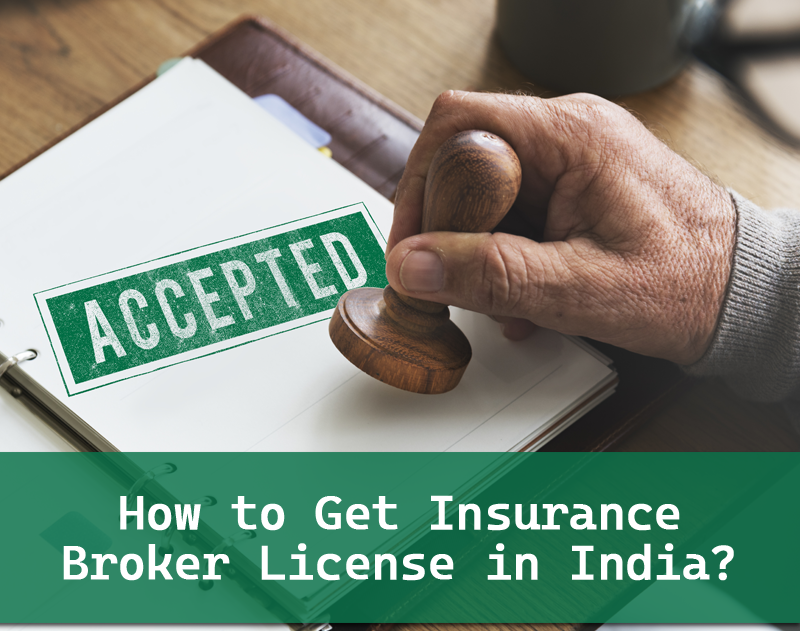Insurance Broker License in India | Full Details [Updated 2024]
This article will walk you through the importance of an insurance broker license in India, how to get a broker license, application procedures, insurance broker license fees, eligibility criteria, list of documents required, cost, and all other factors that you need to look into in order to apply for an insurance broker license in India.
What’s In This Blog?
> Insurance Broker License in India; An Overview
> Why insurance broker license is required?
> How can I get an insurance broker license in India?
> Points to consider while applying for an insurance broking license in India?
> How much does it cost to get a broker license in India?
> What is the insurance broker license validity and renewal?
> Documents required for applying for an insurance broker license in India?
If you’re planning to start an insurance broking firm in India, securing an Insurance Broker License in India is the first and most essential step. This license not only grants you the legal authority to represent multiple insurance companies but also enables you to offer a wide range of policies to your clients, giving them the flexibility they need.
However, the procedure for applying for an insurance broker license comes with its own set of stringent guidelines established by the Insurance Regulatory and Development Authority of India (IRDAI).
In this article, we’ll walk you through everything you need to know about obtaining an Insurance Broker License in India—from eligibility requirements to the application process—so you can start your journey with confidence and compliance.
Insurance Broker License in India; An Overview
The Insurance Regulatory and Development Authority of India (IRDAI) is responsible for issuing licenses to insurance brokers in India. An individual or a company must take the following actions in order to receive an insurance broker license in India.
Eligibility: The individual or company must meet the eligibility criteria set by the IRDAI. This includes being at least 21 years of age, having a minimum educational qualification of 10+2, and having a minimum net worth of INR 50 Lakhs.
Pass the licensing exam: The individual or company must pass the licensing exam, which tests the applicant’s knowledge of insurance laws, regulations, and practices.
Register with IRDAI: After passing the licensing exam, the individual or company must register with IRDAI by submitting the required documents and paying the registration fee.
Obtain a certificate of registration: Once the registration process is complete, the IRDAI will issue a certificate of registration, which serves as the insurance broker license.
Regulation compliance: As an insurance broker, you are required to abide by all rules and regulations established by the IRDAI and should routinely renew your license.
It’s important to remember that getting an insurance broker license in India can be difficult and time-consuming, therefore it’s advised to seek advice and help from a specialist. It’s also critical to remember that if the licensee disregards the rules and regulations, IRDAI has the right to revoke the license.
Why insurance broker license is required?
You have to be authorized as per government norms in order to sell multiple insurance policies to the public on behalf of different insurance companies. Being a licensed insurance broker, helps you to have the privileges of government laws to run your insurance broking business in a legal and safest way.
Your insurance broker license will also act as a symbol of trust in front of your customers as well as the insurance companies that you are tied up with.
Who regulates insurance broker license in India?
The Insurance Regulatory and Development Authority of India (IRDAI) has the ultimate authority over the issue of insurance broker licenses. The Insurance Act 1938, the Insurance Regulatory and Development Act 1999, and the Insurance Regulatory and Development Authority of India (Insurance Brokers) Regulations, 2018 are the pillars of the Insurance Broker License.
How can I get an insurance broker license in India?
In order to get licensed by the IRDAI and to work as an insurance broker in India, the most important step is to apply for an insurance broker license in India, for that, you have to pass through a certain set of pre-defined minimum requirements:-
- Your corporate structure
- Business purpose
- Qualification of the concerned parties
- Capital amount
- Net worth
- Deposits
- Office space and related facilities
What are the points to consider while applying for an insurance broking license in India?
- Your business name must have the word ‘Broker/Broking’ in its name
- You need to make sure that the MOA must contain insurance broking as its main objective
- The principal officer must have satisfactory qualifications
- The principal officer must have successfully passed the broker exam
- The principal officer must have acquired mandatory training
- The company must fulfill the minimum capital requirement in the manner provided for in the Regulations
- You have to make sure your proposal has no foreign capital exceeding 26% of the total paid-up capital
- You have to make sure that the fixed deposit of 20% of the initial capital is made in a scheduled bank
Also, you need to make sure that the so-called insurance broking company engages at least two persons with the required qualifications and training and that the persons responsible for procuring insurance business are qualified and trained to the standard level. There has to have enough and sufficient infrastructure and trained manpower to run the insurance broking business.
What are the corporate structure requirements does a broker need to apply for an insurance broker license?
In order to apply for an insurance broker license, you must satisfy the criteria below.
- Your insurance broking company has to be registered under the Companies Act 2013 or the previous Company Law 1956
- If it is a partnership firm, then it should be registered under the Limited Liability Partnership Act, 2008
- If it is a cooperative society, then it should be registered under the Co-operative society act 1912
How much does it cost to get a broker license in India?
About insurance broker license fees in India, an insurance broker must satisfy the below capital requirements if you are about to apply for a broker’s license. Recently, in 2018, Insurance Regulatory and Development Authority (IRDA) updated the Insurance Broker Regulations and so Insurance Broker Registration can be done as follows:-
- If you are a Direct broker, then your capital requirement is Rs. 75 lakhs
- If you are a Re-insurance broker, then your capital requirement is Rs. 4 Crore
- If you are a Composite Broker, then your capital requirement is Rs. 5 Crore
You also have to satisfy the net worth requirement for applying for a broker license which is:-
During the time of registration, a direct insurance broker must maintain 50 lakh whereas composite and reinsurance brokers must maintain 50% of the minimum financial requirement. According to IRDAI Regulations, the insurance broker license applicants can be anyone from the following:-
- Any company listed under the Companies Act, 2013 or 1956.
- Any LLP registered under the Limited Liability Partnership (LLP) Act, 2008. Both partners should not be (1) any individual residing outside India (2) a Foreign LLP enrolled under Foreign Country Laws (3) a Non-resident entity.
- Any registered co-operative society generated under the Co-operative Societies Act, 1912, or any similar laws
- Any individual recognized by the Authority
By now, I hope you have clarity on who can apply for an insurance broker license. Following that, let’s look at a few more criteria to be satisfied.
- The entity name should contain the word ‘Broker’ or ‘Broking.’
- If the capital pay holds any foreign capital, it should not exceed 26% of the total paid-up capital.
- The principal officer must have the basic qualifications, undergone training, and cleared the broker’s exam.
- The company must involve at least two persons with adequate qualifications and training.
- Insurance broking should be the chief aim of the Memorandum of Association
What are the documents required for applying for an insurance broker license in India?
Below listed the documents (checklist for new broker license application in India) that you need to submit along with the information specified in Form C of Schedule I of the IRDA Regulations, 2018.
- The Insurance Broker License application form is properly completed with a declaration duly signed by at least two directors/partners
- The demand draft against the insurance broker license fee
- A photocopy of the Memorandum of Association (MOA) and the Articles of Association (AOA) of the newly registering insurance broking company or Partnership Deed in case of a partnership firm
- The audited balance sheet of the newly forming insurance broking company
Should submit proof of fixed deposit with any scheduled bank as required by the regulation. - List of all shareholders of the applicant company; present as well as proposed. If the shareholder is a company, provide the Board Resolution passed by the company in investing and promoting the applicant company.
- Should submit a detailed statement of the shareholding pattern of the company, with names of the shareholders, number of shares held, share certificate numbers, and folio numbers, everything duly verified and certified by the auditor
- The auditor’s certificate regarding the NBFC status of the shareholding company. If the shareholding company is a Non-banking finance company, then a No Objection Certificate from RBI NA is required
- The annual reports of the shareholder companies for the last 3 years.
- A detailed CV and attested testimonials including the training certificate of the Principal Officer have to be submitted. The applicant should submit information about a Principal Officer such as qualifications, training compliance, and other criteria as mentioned in Form G of Schedule 1.
A written declaration of the Principal Officer, the directors/partners, and required managers confirms that they don’t abide by any disqualifications as mentioned in Section 42D of the Act. - IT returns for the last 3 years of every individual shareholder, their net worth showing certificates, and also affidavit(s) regarding the source of invested funds.
Complete details of every director/partner, promoter, and important managerial personnel. - Current bank account details.
- List of minimum two qualified brokers and their qualifications.
The detailed CVs and testimonials of the key managerial persons holding different positions in the company. - Details of all the persons qualified and trained along with their testimonials and original training certificates
Complete list of persons responsible for procuring insurance business along with their testimonials.
The balance sheet of the company. - Proof of details of infrastructure like IT infra, equipment, office space, and the workforce.
- Important list of prospective clients with expected premiums.
- A detailed business plan including the business and income projection for the next 3 years with the class-wise break-up, projected revenue account, profit and loss account and balance sheet for the next 3 years, and organization chart mentioning roles and responsibilities.
- An affidavit has to be submitted regarding non-suffering from any disqualification under Section 42 D of the Insurance Act.
Other documents as instructed by the officials at the time of application submission
Now you clearly understand how modern insurance broker software functions as a robust automation platform for effectively managing your business.
Now let’s see how the most modern insurance broker software reshapes the insurance broking landscape, enhances the policyholder’s journey, prioritizes customer satisfaction, and transforms the policyholder’s experience.
What is the insurance broker license validity and renewal?
From the date of issuance, the insurance broker license has a validity of three years. For renewals, you have to apply at least 30 days prior to the expiry date.
From a futuristic perspective, it is visible that the insurance broking industry is becoming intensely complex and competitive. Sales conversion rates are directly proportional to your in-house process management in terms of leads management, systematic follow-ups, policies, claims management, and professional client communication. The best and easiest way to shine in the insurance broking business is to have one of the best CRM for insurance brokers.
> List of the World’s Best Insurance Broking Software
> 10 Best Handpicked Software Products for Insurance Brokers in India
By adopting these innovations, brokers can ensure operational efficiency, elevate client satisfaction, and stay ahead in a competitive market. Embrace the future of insurance broking with these cutting-edge solutions and transform your business into a model of efficiency and client-centric excellence.
Akhil Raju
Author at Protracked Software Solutions






